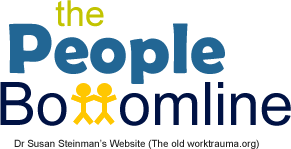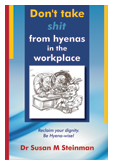
Employee Wellness Programs
- Yethu iWellness (Integrated Health and Wellness)
- Tailored Programmes
- Climate Surveys
- Workplace Violence/Bullying Prevention

Copyright Dr Susan Steinman

(The impression of the current format of Dr Susan Steinman's work as published by the Service Seta The publication represent a holistic approach in employee wellness - a series of small books on the integrated health and wellness approach.)
Will publish a consolidated and improved text book of
Dr Susan Steinman's Yethu iWellness Toolkit in 2010
WHAT IS YETHU iWELLNESS© ALL ABOUT?
History
The Yethu iWellness toolkit was conceptualised by Dr Susan Steinman. The Service Seta decided to engage Dr Steinman to develop an information toolkit for their members who would like to introduce an employee wellness programme, using the integrated health and wellness approach.
Copyright
The reason why Knowledge Resources can now publish a book for the EWP professionals and students is because Dr Steinman retained copyright and allowed to Service Seta to right to publish the toolkit in the "box" format for its members only. While the Service Seta will continue to enjoy the right to publish the toolkit in the specific for its members as hard copy only, Knowledge Resources will obtain the right to publish a new version which will be sold in book stores and on the internet and also enjoy the right to arrange training courses on the toolkit. The publication is due to be released around March 2010.
Please note that NOBODY - and there are persons who claim they have such a right by virtue of a professional relationship - have the right to develop training courses on the Yethu iWellness toolkit - this right is reserved by Dr Steinman and through Knowledge Resources, training courses will be represented.
The Team: Authors, Language Editing and Graphics
-
Susan Steinman(PhD, DPhil)
Dr Susan Steinman is the conceptualised and is the main author, the copyright holder and the editor/co-authored the other contributions in the Yethu iWellness toolkit.
1.1.1 OTHER CONTRIBUTORS
The following individuals contributed to the content in one way or another:
Andy Beke (MB, ChB, MMed, FCPHM[SA] - Health Management & OHS manuals; Nicolene Barkhuizen (PhD) - Health Management manual; Gail Gemmel (B.Hons (OHS), R.N.) - OHS manual; Deidre Nel (PhD) - Psychosocial Wellness; Evanthe Schurink (BA[SW]) - Health Management manual
Their contributions to sections in the manuals relevant to their area of expertise ensured the highest level of accuracy and quality.
-
Language Editing and Proof Reading
Language editors Celia de Vos Belgraver [main language editor], Connie Nel and Sandy Meyer did excellent work taking care of language and proof reading the manuals.
-
Graphic Design and Publishing
Karin Janneke of Full Circle Marketing and Graphic Design was responsible for the graphic design and layout of the toolkit.
What is Yethu iWellness all about.
Yethu iWellness represents a holistic approach to employee wellness by recognizing that any the individual functions within the area of work, the family, a social environment and the community as illustrated below:
Factors Influencing Employee Wellness

(Adapted from the ILO programme, SOLVE, 2002)
Subsequently, the Yethu iWellness, Zulu for 'wellness is ours', programme was developed to serve as a framework guideline for employers to address all aspects of employee health and wellness in one comprehensive programme.
Yethu iWellness is the ideal integrated health and wellness programme, given the following aspects:
▫ Yetu iWellness is introduced within the context of the integrated health and wellness approach while the legal and ethical framework in which workplace wellness operates, the importance of work-life balance and how to meet professional standards in employee wellness. The introduction provides an overview from situational analysis to programme implementation and further covers the issues of benchmarking, utilisation of employee wellness services, monitoring and evaluation
▫ To avoid stigmatisation, HIV/Aids is no longer an isolated issue but would be served under health management, which includes chronic disease management to provide for HIV/Aids, cancer, diabetes, and other diseases. Health management should be all-encompassing and preventative, as well as supportive in the management of health in the workplace.
▫ Psychosocial wellness can be seen as traditional EAP focussing on preventing and addressing psychosocial hazards, such as stress, physical and emotional violence, overload, substance abuse, etc., through risk assessments and policies, as well as organisational, environmental and individually focussed interventions.
▫ Occupational hygiene and safety management. While it could be argued that this section should be accommodated under health management, it is not the same for all enterprises and sectors. Legal compliance is an important component of safety management as well as the prevention of occupational disease, and thus of the total wellness of the employee.
▫ Organisational wellness. Here, issues such as moral regeneration, integrity, organisational ethics, organisational culture and values, whistle-blowing and productivity are crucial to inculcate a coherent sense of moral wellbeing within employees. Given the increase in corruption in general, and the interrelatedness between bullying and corruption, absenteeism, productivity, etc., organisational wellness deserves to be a stand-alone issue.
It is crucial to note that all these issues are interrelated. The interaction is illustrated below:

A simple example of the interrelatedness of health and wellness issues is to take look at the impact of stress on the individual in the workplace. This my well lead to workplace violence (the stressed employee could become irritable and abusive (Psyhosocial Wellness), which in turn may lead to health problems such as migraine, problems with blood pressure (Health Management) and could lead to accidents or injury (Occupational Health and Safety) and may affect present in the organisation as lower morale, absenteeism and a drop in productivity (Organisational Wellness)
The successful introduction of Yethu iWellness in the workplace requires that the employer interact with all participants and involve all employees to promote the aims and objectives of the wellness programme. Furthermore, it must be remembered that Yethu iWellness underscores and delivers an unequivocal message that illness, psychosocial problems, accidents and other problems can be prevented. Preventative action is thus encouraged.
Since employee wellness issues and situations are complex and solutions abound, Yethu iWellness is adaptable. One single approach to a particular problem does not apply to all environments and cultures. Several approaches and options are presented and discussed so that employers can develop programmes and actions that meet the company's specific needs.
It is also of the utmost importance to note that monitoring and evaluation of the EWP is encouraged in a results-orientated approach. Regular monitoring and evaluation will result in the EWP becoming self-sustainable.
The toolkit for the Yethu-iWellness programme comprises five sections with short, practical subsections that are useful for small and medium enterprises as a referencing tool when implementing an EWP. It is, however, crucial to note that this is a how-to and not a training toolkit for the enterprise. Different approaches to employee wellness abound and this toolkit allows the enterprise to select an approach according to enterprise size and budget. The toolkit is also highly flexible.
This toolkit, with employee wellness as its ultimate goal, is underpinned by the following guiding principles:
▫ Integrated: considering all types of interventions and balancing prevention, treatment and evaluation;
▫ Participatory: involving all parties concerned with active roles in designing and implementing wellness initiatives;
▫ Culturally sensitive: addressing the variations of perceptions and understanding of the workplace and community problems;
▫ Gender sensitive: addressing the variations of perception and understanding of individual and organisational problems;
▫ Non-discriminatory: removing any form of discrimination; and
▫ Systematic: organising coherent actions towards achieving targets realistically within agreed time frames.
Do you wish to be notified when Yethu iWellness, the book, is released? If so, click :
![]() TAILORED PROGRAMMES
TAILORED PROGRAMMES
There is no one-size-fits all when it comes to employee wellness. The nature of work differs, the environmental stressors differ, organisational culture differs. There are simply too many variables in each organisation requiring a unique intervention.
With the uniqueness of each organisation in mind, an employee wellness programme is designed for your company or organisation and for your needs. Talk to Dr Susan Steinman about your needs and the ideal programme for you - her or call +27 82 459-2082
![]() CLIMATE SURVEYS
CLIMATE SURVEYS
Sometimes a climate survey or a survey to determine whether specific programmes could be helpful is necessary before you decide on an intervention. For example, you may wonder why your organisation cannot retain staff in a certain department. A survey will could pinpoint the problem and help us to tailor an appropriate intervention for you.
![]() WORKPLACE VIOLENCE & BULLYING
WORKPLACE VIOLENCE & BULLYING
Workplace violence and bullying is sometimes at the heart of staff turnovers, absenteeism and a drop in productivity in the workplace. As an international workplace violence expert Dr Susan Steinman can help your organisation back on track with simple, cost-effective interventions through a bottom-up approach. Talk to her! or call +27 82 459-2082 during office hours.
(Click on image below to go to our store)

Read more...
Victim Support
Go to the 'For Victims' section
on our website for tools
and information on bullying.

Employee Wellness Program
If you are an employer, you
can contact us to arrange
a employee wellness program
for your organisation.

Receive our monthly Newsletter
Fill in your e-mail below and receive
updated information and
interesting news about workplace
communication, career
inspiration, workshops, conferences,
website updates, programmes and training
and the Foundation's work.
Subscribe to the WorkcomNews
